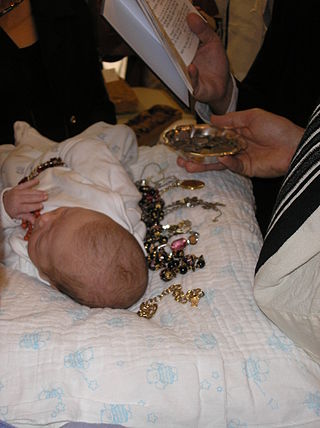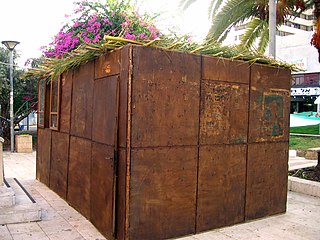Related Research Articles

The Mishnah or the Mishna is the first written collection of the Jewish oral traditions that are known as the Oral Torah. It is also the first work of rabbinic literature, with the oldest surviving material dating to the 6th to 7th centuries BCE.

The Talmud is, after the Hebrew Bible, the central text of Rabbinic Judaism and the primary source of Jewish religious law (halakha) and Jewish theology. Until the advent of modernity, in nearly all Jewish communities, the Talmud was the centerpiece of Jewish cultural life and was foundational to "all Jewish thought and aspirations", serving also as "the guide for the daily life" of Jews.
Nashim is the third order of the Mishnah containing family law. Of the six orders of the Mishnah, it is the shortest.
Seder Zeraim is the first of the six orders, or major divisions, of the Mishnah, Tosefta, and the Talmud, and, apart from the first tractate which concerns the rules for prayers and blessings, primarily deals with the laws of agricultural produce and tithes of the Torah which apply in the Land of Israel, in both their religious and social aspects.
Moed is the second Order of the Mishnah, the first written recording of the Oral Torah of the Jewish people. Of the six orders of the Mishna, Moed is the third shortest. The order of Moed consists of 12 tractates:
- Shabbat: or Shabbath ("Sabbath") deals with the 39 prohibitions of "work" on the Shabbat. 24 chapters.
- Eruvin: (ערובין) ("Mixtures") deals with the Eruv or Sabbath-bound - a category of constructions/delineations that alter the domains of the Sabbath for carrying and travel. 10 chapters.
- Pesahim: (פסחים) deals with the prescriptions regarding the Passover and the paschal sacrifice. 10 chapters.
- Shekalim: (שקלים) ("Shekels") deals with the collection of the half-Shekel as well as the expenses and expenditure of the Temple. 8 chapters
- Yoma: (יומא) ; called also "Kippurim" or "Yom ha-Kippurim" ; deals with the prescriptions Yom Kippur, especially the ceremony by the Kohen Gadol. 8 chapters.
- Sukkah: (סוכה) ("Booth"); deals with the festival of Sukkot and the Sukkah itself. Also deals with the Four Species which are waved on Sukkot. 5 chapters.
- Beitza: (ביצה) ("Egg"); deals chiefly with the rules to be observed on Yom Tov. 5 chapters.
- Rosh Hashanah: deals chiefly with the regulation of the calendar by the new moon, and with the services of the festival of Rosh Hashanah. 4 chapters.
- Ta'anit: (תענית) ("Fasting") deals chiefly with the special fast-days in times of drought or other untoward occurrences. 4 chapters
- Megillah: (מגילה) ("Scroll") contains chiefly regulations and prescriptions regarding the reading of the scroll of Esther at Purim, and the reading of other passages from the Torah and Neviim in the synagogue. 4 chapters.
- Mo'ed Katan: deals with Chol HaMoed, the intermediate festival days of Pesach and Sukkot. 3 chapters.
- Hagigah: (חגיגה) deals with the Three Pilgrimage Festivals and the pilgrimage offering that men were supposed to bring in Jerusalem. 3 chapters.

The Jerusalem Talmud or Palestinian Talmud, also known as the Talmud of the Land of Israel, is a collection of rabbinic notes on the second-century Jewish oral tradition known as the Mishnah. Naming this version of the Talmud after Palestine or the Land of Israel—rather than Jerusalem—is considered more accurate, as the text originated mainly from Galilee in Byzantine Palaestina Secunda rather than from Jerusalem, where no Jews lived at the time.

Kodashim is the fifth of the six orders, or major divisions, of the Mishnah, Tosefta and the Talmud, and deals largely with the services within the Temple in Jerusalem, its maintenance and design, the korbanot, or sacrificial offerings that were offered there, and other subjects related to these topics, as well as, notably, the topic of kosher slaughter.
Tohorot is the sixth and last order of the Mishnah. This order deals with the clean/unclean distinction and family purity. This is the longest of the orders in the Mishnah. There are 12 tractates:
- Keilim: ; deals with a large array of various utensils and how they fare in terms of purity. 30 chapters, the longest in the Mishnah.
- Oholot: ; deals with the uncleanness from a corpse and its peculiar property of defiling people or objects either by the latter "tenting" over the corpse, or by the corpse "tenting" over them, or by the presence of both corpse and person or object under the same roof or tent.
- Nega'im: ; deals with the laws of the tzaraath.
- Parah: ; deals largely with the laws of the Red Heifer (Para Adumah).
- Tohorot: ; deals with miscellaneous laws of purity, especially the actual mechanics of contracting impurity and the laws of the impurity of food.
- Mikva'ot: ; deals with the laws of the mikveh.
- Niddah: ; deals with the Niddah, a woman either during her menstrual cycle or shortly after having given birth.
- Makhshirin:, the liquids that make food susceptible to tumah.
- Zavim: ; deals with the laws of a person who has had abnormal genital discharge.
- Tevul Yom: deals with a special kind of impurity where the person immerses in a mikveh but is still unclean for the rest of the day.
- Yadayim: ; deals with a Rabbinic impurity related to the hands.
- Uktzim: ; deals with the impurity of the stalks of fruit.
Neghaʿim is the third tractate of the order of Tohorot in the Mishnah. It consists of fourteen chapters. Nega'im describes the various forms of tzaraath, a leprosy-like disease described in the Parshiyot of Tazria and Metzora in the Torah, which affected people, clothing, and homes. The tractate describes the different types of blemishes symptomatic of the disease, and the various rituals involved in purifying someone who has been affected by it.
Demai (Hebrew: דְּמַאי, is the third tractate of Seder Zeraim of the Mishnah and of the Talmud. It deals with the Jewish legal concept of demai, meaning doubtfully tithed produce, and concerns the laws related to agricultural produce about which it is suspected that certain obligatory tithes have not been separated in accordance with requirements derived from the Torah. The tithes in question are ma'aser rishon, terumath ma'aser, and ma'aser sheni or ma'aser ani, depending on the year of the Sabbatical year cycle.
Terumot is the sixth tractate of Seder Zeraim of the Mishnah and of the Jerusalem Talmud. This tractate discusses the laws of teruma, a gift of produce that an Israelite farmer was required to set aside and give to a kohen (priest). There were two kinds of terumot given to the priest: the regular heave-offering, known also as the terumah gedolah, which the Israelites were required to give to the priest from the produce of their fields; the other was the terumat ma'aser, namely, the gift that the Levites were required to put aside for the priests from the tithe which ordinary Israelites had been required to give to them.

Pesachim, also spelled Pesahim, is the third tractate of Seder Moed of the Mishnah and of the Talmud. The tractate discusses the topics related to the Jewish holiday of Passover, and the Passover sacrifice, both called "Pesach" in Hebrew. The tractate deals with the laws of matza and maror, the prohibitions against owning or consuming chametz (leaven) on the festival, the details of the Paschal lamb that used to be offered at the Temple in Jerusalem, the order of the feast on the first evening of the holiday known as the Passover seder, and the laws of the supplemental "Second Pesach".

Avodah Zarah is the name of a tractate of the Talmud, located in Nezikin, the fourth Order of the Talmud dealing with damages. The main topic of the tractate is laws pertaining to Jews living amongst Gentiles, including regulations about the interaction between Jews and "avodei ha kochavim", which literally interpreted is "Worshipers of the stars", but is most often translated as "idolaters", "pagans", or "heathen."

Berakhot is the first tractate of Seder Zeraim of the Mishnah and of the Talmud. The tractate discusses the rules of prayers, particularly the Shema and the Amidah, and blessings for various circumstances.

Kil'ayim is the fourth tractate of Seder Zeraim of the Mishnah, dealing with several biblical prohibitions of mixed species, namely, planting certain mixtures of seeds, grafting different species of trees together, growing plants other than grapevines in vineyards, crossbreeding animals, working a team of different kinds of animals together, and mixing wool and linen in garments.

Shevi'it is the fifth tractate of Seder Zeraim of the Mishnah, dealing with the laws of leaving the fields of the Land of Israel to lie fallow every seventh year; the laws concerning which produce may, or may not be eaten during the Sabbatical year; and the cancellation of debts and the rabbinical ordinance established to allow a creditor to reclaim a debt after the Sabbatical year (Prozbul).

Sukkah is a tractate of the Mishnah and Talmud. Its laws are discussed as well in the Tosefta and both the Babylonian Talmud and Jerusalem Talmud. In most editions it is the sixth volume of twelve in the Order of Moed. Sukkah deals primarily with laws relating to the Jewish holiday of Sukkot. It has five chapters.

Tractate Middot is the tenth tractate of Seder Kodashim of the Mishnah and of the Talmud. This tractate describes the dimensions and the arrangement of the Temple Mount in Jerusalem, and the Second Temple buildings and courtyards, various gates, the altar of sacrifice and its surroundings, and the places where the Priests and Levites kept watch in the Temple.

Shabbat is the first tractate of Seder Moed of the Mishnah and of the Talmud. The tractate deals with the laws and practices regarding observing the Jewish Sabbath. The tractate focuses primarily on the categories and types of activities prohibited on the Sabbath according to interpretations of many verses in the Torah, notably Exodus 20:9–10 and Deut. 5:13–14.
Solomon Sirilio (1485–1554), the son of Joseph Sirilio, was a Spanish rabbi and author of one of the first commentaries written about the Jerusalem Talmud.
References
- ↑
 Singer, Isidore; et al., eds. (1901–1906). "OHALOT ("Tents")". The Jewish Encyclopedia . New York: Funk & Wagnalls.
Singer, Isidore; et al., eds. (1901–1906). "OHALOT ("Tents")". The Jewish Encyclopedia . New York: Funk & Wagnalls. - ↑ כלך אצל נגעים ואהלות
- ↑ Midrash Tehillim 1
- ↑ Jerusalem Talmud, Moed Kattan 2:5
- ↑ אנציקלופדיה יהודית - אהלות
- ↑ Jastrow, אָהֳלוֹת
- ↑ Concordance, אֹהֶל (שם עצם)